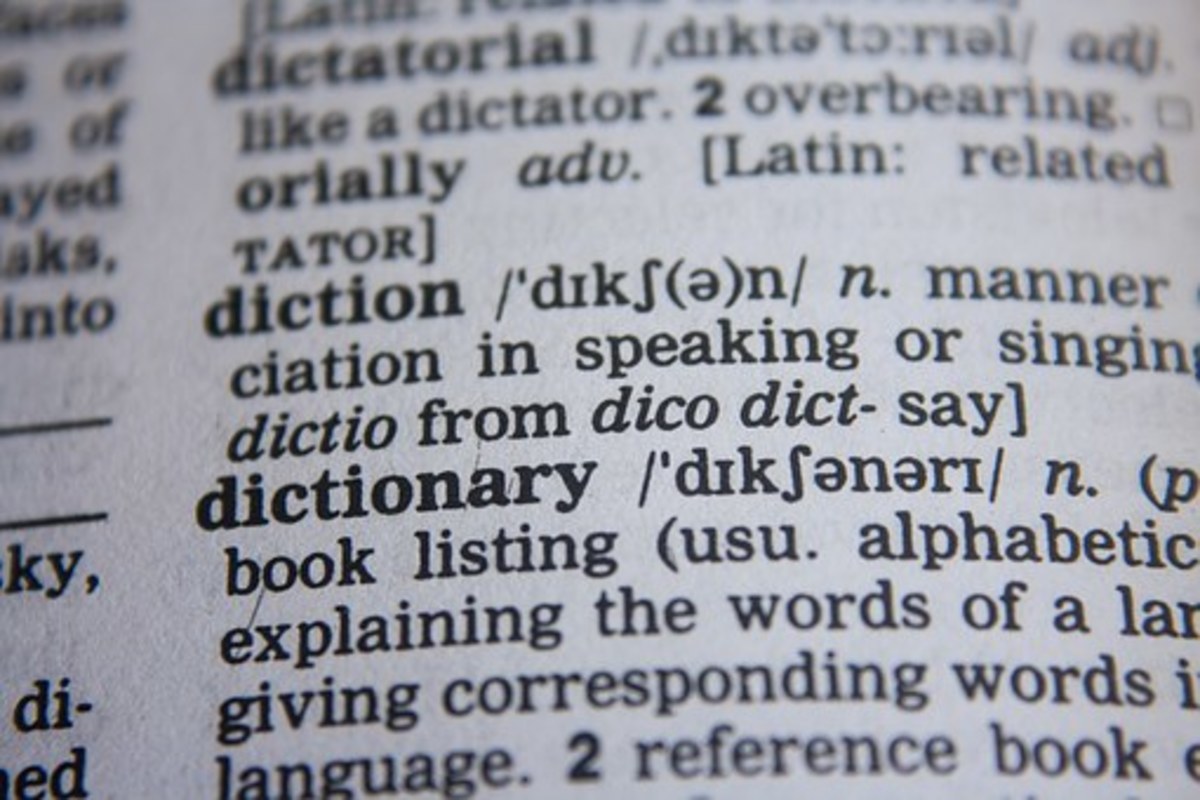How to Increase Your Vocabulary -- Improve Your Language Skills
Verbal Intelligence Grows With Time
Drive is the best predictor of action, so here is reason to grow your vocabulary! We tend to describe our cognitive abilities with intelligence. General intelligence is the subject of long, ongoing research in psychology. To that end, researchers agree today that intelligence involves at least two major parts; intelligence consists of an innate, general fluid intelligence and an extrinsic, general crystallized intelligence.
Fluid intelligence is related to visualization, abstract reasoning, and quantitative conceptualization. Crystallized intelligence is related to reading comprehension, reasoning, and general knowledge.
Fluid intelligence is pre-set and peaks in young adulthood, while crystallized intelligence, by its nature, rises steadily with age.
Verbal faculties rely on our experiences, exposure to facts, and our trials and triumphs. Most of our reasoning is conducted through comparisons -- analogies that build on each other and which we store in more depth as we grow older. Learning vocabulary words won't make you a more intelligent person for the sake of intelligence, but it will enable you to think in more refined terms.
The Usage of Words in Daily Life is Governed by the Associations we Attach to Them

Enhance your ability to inherit the meaning of new words you encounter
You should assume that you encounter unfamiliar words regularly, and if such isn't the case, start reading a few news articles and survey the contents of other literary works.
When you see a word you don't know, stop and make a mental note. Scan the surrounding information a couple of times and scrutinize the style and tone for hints about the meaning of the word. There's almost invariably enough information to place the word in fair perspective. Does the passage hinge on the word, or is the word ancillary; or is it not needed at all? Ask how you can describe the word, through the purpose you can perceive in it. Maybe the author was brusque and understandable up until the new word, and maybe this new word is the operative shift in his indictment. Then the word would seem to have at least some relation to the preceding opinions and assertions by the author.
Set Specific Benchmarks
I assure you, the stronger your vocabulary is, the weaker becomes your effort at understanding things. So periodically test yourself to evaluate your vocabulary. There are various forms of vocabulary 'tests' -- some are cobbled together like brochures while others are constructed meticulously with a lot of thought.
Short of taking a scholastic vocabulary test under strict controls, there are other tests avaialble to aid establishing your level of comprehension. Credible tests are exhaustive -- meaning you'll have no clue left before the test will have no words left. Useful tests are likely to be around and in the same format for a while -- long enough to reassess your progress a few times.
While there are many good inventories for measuring one or another aspect of vocabulary, the benefit of benchmarking is tracking progress, not least is it expending time trying a high score. Taking the same test too often, defeats the purpose of measuring ongoing acquisition. Building linguistic skills is naturally a process occurring in increments. And language knowledge is measured incrementally. It's a matter of degree.
Forcing studens to memorize lists of vocabulary words is absurd and laughable as it's only beneficial before the test. After the test, those words are expunged from memory because examinees have no knowledge of their meanings. Incidentally, exercising rote memorization does prepare pupils in the dichotomy between means and ends; between education and convocation.
One Word -- Different Senses
Punsters enjoy creating word arrangements that employ wit. Usually a pun will exploit double entendres related to an implied meaning or innuendo. Sometimes a word's different meanings, established and known, will give rise to more risible puns. To wit, another kind of pun generally misappropriates similarities in how words sound to influence the mode of rhetoric. Then, a lot of puns derive from allusions to intricate metaphors. They often compound on each other for the purpose of representing the abstract in scaled to form analogies.
Take the word sense: Think about every meaning of this word that you think has validity.
Here is my understanding of possible senses of sense.
1. Sense (noun): Hearing, Touching, Seeing, Smelling, Tasting.
2. Sense (noun): To have an idea about something.
3. Sense (noun): A difference in meaning for a word.
4. Sense (verb): To detect by use of one's senses.
5. Sense (verb): An instrument detecting the presence of something.
Interestingly, I picked up on five out of seven definitions provided by the Oxford Dictionaries, online site.
6. I missed an obscure definition (noun) related to Mathematics and Physics.
7. However, I also missed a rudimentary meaning of sense (noun), particularly related to the notion of common sense.
In effect, this exercise helps in assessing our truest understanding of a word. It surprised me to think about the idea that sense, in itself, strongly refers to judgment and how seldom I identified it with a primary, straightforward application. It shows me how easy it is constructing abstractions while losing the associations with the basic forms of a word.
So it's important to master the fundamental or concrete representations of words before learning about higher order semantic relations. Yet, it is possible to accrete advanced vocabulary words absent robust comprehension of basic words. In fact, we all possess advanced vocabulary related to topics we do not fully understand. Myriad examples inform our vocabulary from medical procedures, automobile performance, and legislative processes.
Vocabulary Games and Useful Resources
- Dictionary and Thesaurus - Merriam-Webster Online
Free online dictionary, thesaurus, spanish-english and medical dictionaries, audio pronunciations, Word of the Day, word games, and many more high-quality Merriam-Webster language resources. - Oxford Dictionaries Online
Free online World and American English dictionary with puzzles & games, tips & guidance about better writing, spelling, grammar and other resources for children and schools by Oxford Dictionaries Online - Dictionary, Encyclopedia and Thesaurus - The Free Dictionary
Online Dictionary - Multiple dictionaries including: English dictionary, medical dictionary, legal dictionary, financial dictionary, computer dictionary, thesaurus, dictionary of acronyms and abbreviations, dictionary of idioms, thesaurus, Columbia e - Thesaurus.com | Find Synonyms and Antonyms of Words at Thesaurus.com
Thesaurus.com - the largest and most trusted free online thesaurus brought to you by Dictionary.com. Quickly find synonyms and antonyms. - Play online, learn online and feed the hungry | Freerice.com
- Merriam-Webster Online
Merriam-Webster provides a free online dictionary, thesaurus, audio pronunciations, Word of the Day, word games, and other English language resources. - Brain Games & Brain Training - Lumosity
Practice
Practice writing sometimes using words that are fresh and you should hasten the uptake fast. Do not be afraid to misuse words, and avail yourself of the advice by asking for its correct use.
Before long, you will be fully comfortable using the word as part of your active vocabulary. But this is only true of normal words that you would already gain exposure to more frequently, at some key phase in advancement in knowledge acquisition.
Aside from the required duty of learning words that you've found to be necessary to learn through repeat encounters, it is fun to pay some casual attention to vocabulary. Search a word list and see how many words you don't know, and then observe how many words that you do know only because of your efforts. Play a few games and find the fun in vocabulary, variety, and all that is entailed in the attainment of mastery over these elements.
Take a guess
It is important to anticipate what the word means, independent of the process of defining it. As much as you can try to infer its meaning, you are putting in work to establish a working meaning for yourself. Sometimes the careful recollection about a word and the places you've seen it serves more useful than the definition from the dictionary. There is a bit of importance in truly understanding how a word is used, because the connotation can impose major differences between words that appear as synonyms in a thesaurus.
If possible, try to hear its pronunciation so you can discuss it if need be (without sounding uninformed).
On that note, if you see a word enough times that it's bothersome to temporarily ignore it any longer, make sure to look it up. Use multiple definitions that are superimposed, so you can identify what is basically at the heart of the definition.
Try to find a few examples of the word being used in a typified phrase or a sentence. With the benefit of these examples, try to make your own example that is just slightly modified in order or arrangement. Refer to a thesaurus for the word's synonyms and look up its etymology if you want. See what words are the synonyms when the word is used as the main article, because it helps to relate the word to a web of related words, some of which you might know already. In the course thereafter, you should become much more aware of just how often the word is used, and these are the opportunities to provide a solid reinforcement or adjustment of your notion of it.
Assess your progress
You're consciously serious about improving your vocabulary and your handle on communication; you're unsure how you're faring. You must compare your fluency of present to your fluency of the past. I remember finding a journal (that we had to keep for a class in schoo)l and reading through two year old entries. I reminisced about what I would be doing around that time; how I was obsessed with sports trivia and wrote about my team smashing the other team and the other game from last night and the night before.
Besides feeling that I barely remembered writing those entries, I noticed enthusiastic trash talk... how one team had clobbered, or destroyed, or pulverized some other team. And as I thought about it it dawned on me that that was the language the sportscasters and commentators used and I understood how I'd picked up the terminology without being too aware of it. My other thought after reading through my journal entries was that I must have been a terrible student in language arts. The writing was chock full of bombastic words and yet it seemed so repetitious and insubstantial. That composition book confirmed for me how I had improved markedly as a writer.
I digress... but from that experience I practiced looking over old assignments and work that I'd submitted to get a sense of my progress and development as a writer.
I recommend anyone seeking the ability to articulate complex concepts to keep a record of stuff they've written. It's enlightening to see how ideas are expressed with a little more refinement and how topics are analyzed with a little more sophistication.







